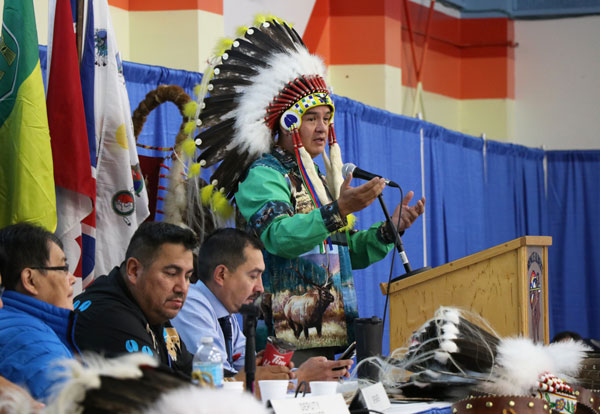
The provincial government says road blocks and checkpoints are designed to keep COVID-19 from spreading, but Indigenous leaders say it’s preventing northern residents from accessing essential goods and services.
The FSIN, Meadow Lake Tribal Council and Métis Nation – Saskatchewan released a joint statement on Tuesday saying the province’s northern checkpoints “have gone too far.”
“We are encouraging all levels of government – federal, provincial and local First Nations and Métis, to work with one another and implement our recommendations as we see fit,” FSIN Chief Bobby Cameron said in the media release. “We support the northern communities and the leadership on their recommendations to stop the spread of COVID-19. We have positive solutions that will help the whole province and flatten the curve.”
The statement includes accusations that northern residents are not being allowed to shop for groceries outside their communities, even if the nearest stores are out of important goods. It also alleged that some government checkpoint workers were being rude and aggressive.
“It disturbs me that the north is being discriminated against and treated unfairly,” Canoe Lake Cree First Nation Chief Francis Iron said in the media release. “We were not consulted, despite what the Provincial Health Order States. These officers have free interpretation of the Public Health Order and a complete lack of respect towards the leadership of the north.”
“I have witnessed it first hand,” English River First Nation Chief Jerry Bernard added. “This Public Health Order is also restricting essential services to our community. We strongly believe that shopping for groceries in Meadow Lake is essential for our communities because there are shortages of goods and services all over the north, and we are being forced into positions that make our communities even more vulnerable.”
Bernard said some members who tried to pass checkpoints to go grocery shopping were told they would be charged if they returned, while Iron said he was turned back while travelling to Flying Dust First Nation, even though the community’s primary cheque signatory lives there.
“Our families on social assistance and the First Nation payroll depend on those cheques and we need to pay our bills,” Iron said in the media release. “These officers have no regard of what an essential service for northerners is.”
Chief Richard Ben of the Meadow Lake Tribal Council said some northern families needed access to baby or infant foods that were only available in limited supply. If local stores ran out, the only way to purchase it is by travelling outside the community.
“Our chiefs support some sections of this Public Health Order, but other sections are causing real concerns and problems for our First Nations,” Ben said in the media release. “We all want to keep this pandemic out of our communities, but we all have to remember that we are in this together. Our north is suffering, and we will not tolerate disrespect and threats against northerners at these check stops.”
Métis Nation – Saskatchewan president Glen McCallum said Indigenous leaders originally put the blockades and checkpoints in place to keep citizens safe. He worries the provincial government forgot about that goal when they took over.
“The officers that have taken over the checkpoints are not taking our citizens and their unique circumstances—living in an isolated place—into consideration,” McCallum said in a media release.
Despite those concerns, McCallum said cooperation with other levels of government must continue, but added that information about public health orders should be conveyed in a respectful manner.
Premier Scott Moe did not hold a media availability on Tuesday. However, on Monday he defended his government from allegations they were not properly consulting with northern leaders.
“The decisions that have been made in the northwest have been consulted on with leaders across the northwest, across the north and across the province, for that matter,” he told reporters. “With respect to the north, they have certainly shaped the decisions that have affected their communities.”
This isn’t the first time northern leaders have raised concerns about check points and road blocks outside their communities.
Commander Rick Laliberte of the North West Communities Incident Command Centre released an open letter to Saskatchewan’s Chief Medical Health Officer on Monday.
The letter outlined concerns from the Treaty Ten Pandemic Council over how check stops and road blocks were staffed by the provincial government, among other issues.
Saskatchewan Public Safety Agency president Marlo Pritchard told reporters he was aware of those concerns, and were investigating them as quickly as they could.
“We recognize that there are challenges and issues that have been raised with us,” Pritchard said. “We are looking at each one individually and trying to address them as they come out.”
